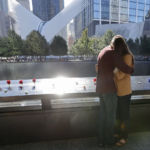One enduring legacy from the terror attacks of 2001 that echoes more loudly each year is how the nation at a time of dire need and crisis came together.
That just doesn’t happen any more.
Polling republished this month by the Pew Research Center recalls how Americans spoke with one voice after nearly 3,000 were killed. There were equal measures of sadness and anger regardless of political affiliation. Politicians of both parties stood on the Capitol steps and sang “God Bless America.”
The Senate authorized the use of military force against Afghanistan, where al-Qaida terrorists were based, by 98-0 with two members not voting, and the House of Representatives by 420 to 1, with 10 not voting.
After the U.S. military was unleashed, 83% of Americans approved. Meanwhile, nearly 8 in 10 Americans displayed the flag. More than 6 in 10 felt a surge of patriotism. And there was record-high trust in the federal government and record-high approval ratings for President George W. Bush and even the news media.
We shudder to recall the cataclysmic terror attack on US Twin Tower and Pentagon and express our heartfelt sympathies to the thousands of victims of the crime against humanity. Nobody can or will ever condone it.
Having said that, most people all over the world and USA have become weary of the so-called war on terror since it all started after 9/11 — particularly the invasion of Iraq and Afghanistan. The moral and ethical basis of international relations was badly ruptured by the so-called preemptive action of the lone superpower on indefensible grounds.
Majority of Americans believe that USA has become more vulnerable to terror attacks than it was prior to the 9/11 incidents. There is an increased perception that US policy on tackling terror has created the grounds for increased terror incidents in several parts of the world. Many countries face extremist threats themselves. The interfaith harmony has also received a jolt it will take a long time to live down.
We strongly believe that a comprehensive change in the superpower’s policy on war against terror is not only overdue but also imperative if we are to contain this number one factor — terror — that is threatening to destabilise governments in many countries.
As much as our collective goal is to fight any form of ideological terrorism or extremism, it should be clear to men of wisdom and reason that war on terror need not necessarily be invasive but very much a matter of moderate people throughout the world asserting themselves to firmly establish the values of civilised world. On a broader plane, international rule of law is better upheld through enlightened







